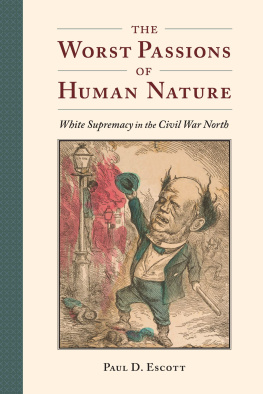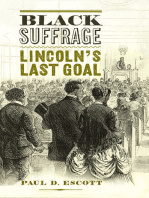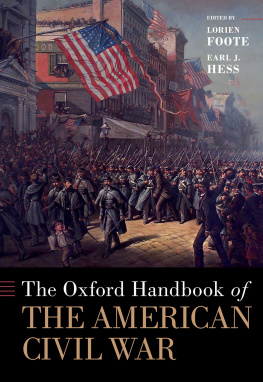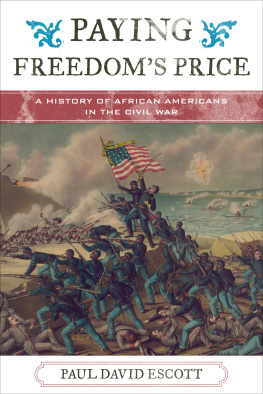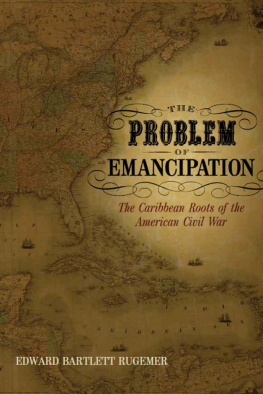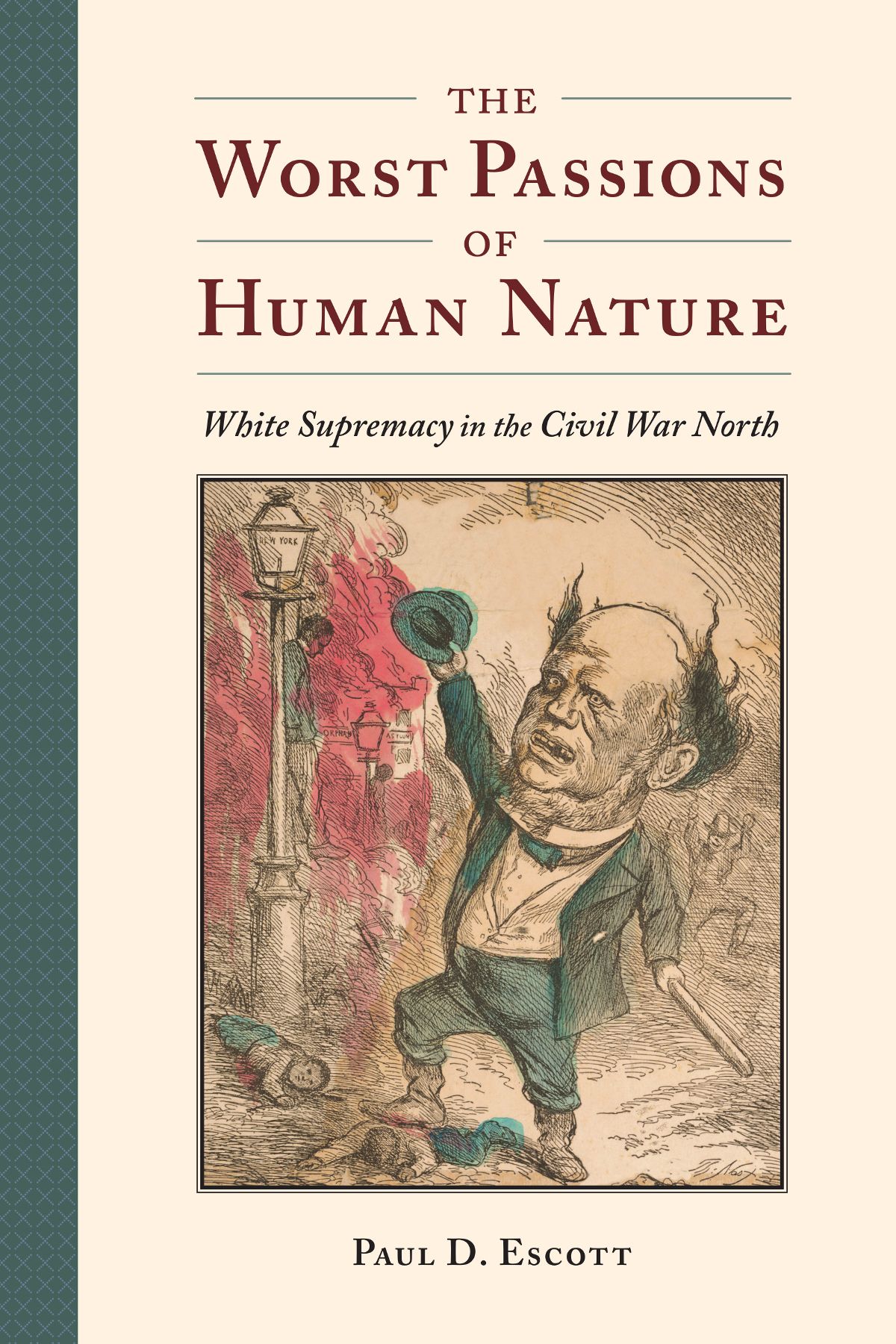
The Worst Passions of Human Nature
A Nation Divided: Studies in the Civil War Era
Orville Vernon Burton and Elizabeth R. Varon, Editors
The Worst Passions of Human Nature
White Supremacy in the Civil War North
Paul D. Escott
University of Virginia Press
Charlottesville and London
University of Virginia Press
2020 by the Rector and Visitors of the University of Virginia
All rights reserved
First published 2020
Library of Congress Cataloging-in-Publication Data
Names: Escott, Paul D., 1947 author.
Title: The worst passions of human nature : white supremacy in the Civil War north / Paul D. Escott.
Description: Charlottesville : University of Virginia Press, 2020. | Series: A nation divided : studies in the Civil War era | Includes bibliographical references and index. Identifiers: LCCN 2019024355 (print) | LCCN 2019024356 (ebook) | ISBN 9780813943848 (hardcover) | ISBN 9780813943855 (epub)
Subjects: LCSH : RacismUnited StatesHistory19th century. | White supremacy movementsUnited StatesHistory19th century. | African AmericansSocial conditionsTo 1964. | Political partiesUnited StatesHistory19th century. | United StatesRace relationsHistory. | United StatesPolitics and government18611865.
Classification: LCC E 185 . E 75 2020 (print) | LCC E 185 (ebook) | DDC 305.800973/09034dc23
LC record available at https://lccn.loc.gov/2019024355
LC ebook record available at https://lccn.loc.gov/2019024356
Illustrations from the Prints and Photographs Division, Library of Congress
Cover art: Leaders of the Democratic Party, 1868, political cartoon by Thomas Nast. (Cornell University Library, Division of Rare and Manuscript Collection, Susan H. Douglas Political Americana Collection, #2214)
Para Candelas
como siempre
Contents
I GRATEFULLY ACKNOWLEDGE the helpful comments of Professor Randall Miller and an anonymous reviewer, both of whom drew on their wide knowledge to help me improve the manuscript. I also want to register my gratitude, as a researcher, to the former Librarian of Congress, Dr. James H. Billington, to the directors of libraries at several major universities, and to their staffs, for making a growing quantity of primary source material available online. Their foresight and efforts have facilitated research for all of us. Finally, I am grateful for the unstinting generosity of many colleagues in the historical profession and especially, in my case, to Robert Durden, Raymond Gavins, Jeffrey Crow, David Goldfield, and John David Smith.
T his is a white mans country.
Today such a statement is offensive to any fair-minded citizen. However, it was an attitude nearly universal in the antebellum United States, North and South, either in aggressive or unspoken forms, underpinning a racism both pervasive and enduring. In the mid-nineteenth century many northerners had no objection to the enslavement of African Americans. Of those who disapproved of slavery, the majority either defended the Souths constitutional right to hold slaves or scorned the idea of racial equality. Only among a small, despised, and dissenting minority of abolitionists was there support for equal rights. Respectable leaders in politics and society unhesitatingly voiced white supremacist views or attitudes.
Stephen Douglas, the leader of the northern Democratic party, repeatedly challenged Abraham Lincoln on race in the 1850s. This government was established on the white basis, insisted Douglas. It was made by the white men, for the benefit of white men and their posterity forever, and never should be administered by any except white men. Abraham Lincoln and the rising Republican party were not as far from these views as many nonhistorians suppose. The new Republican party opposed the expansion of slavery, and Lincoln often quoted the Declaration of Independence to argue that African Americans should have some rights. But white people came first. The western territories were to be a place where white men may find a home. We want them for the homes of free white people, said Lincoln. Repeatedly he denied that he was contending for the establishment of political and social equality between the whites and blacks.
More than two hundred years of history and deeply rooted social practice consigned African Americans to a degraded, inferior role in all parts of the North. They struggled gamely against cradle-to-grave discrimination in the economy, white hostility in social life, and exclusion from the political community in all but a few New England states. The West, where whites went to seek opportunity, was a frontier against slavery because it was also
Moreover, the spirit of the age seemed to be finding in science a confirmation of racism. In 1853 Arthur de Gobineau published in France a four-volume work on the inequality of the races of humankind. His books, reviewed and praised in the United States, argued for separate creation of the races and a racial hierarchy in which Aryans were supreme. That same year in the United States, George Gliddon and the Souths Dr. Josiah Nott published an 800-page work, Types of Mankind, which also argued for polygenesis and an immutable racial hierarchy. They dedicated their tome to Philadelphias Dr. Samuel Morton, who had assembled a large collection of human skulls. Morton concluded that blacks had the smallest brains compared to whites and American Indians, and he asserted that God had intended separate dwelling places for the different races. Harvards Louis Agassiz too declared that the Negro race had been a separate creation, and even Charles Darwins writings discussed civilized and savage races and classified as the lowest savages people from certain parts of Africa.
Thus, it was easy to understand why William Lloyd Garrison declared in 1829 that the emancipation of all the slaves of this generation is most assuredly out of the question. Prejudice had built a fortress that towers above the Alps, said Garrison, who regretted that many years may elapse until progress could dismantle racism brick by brick, and foot by foot. Although Garrison soon recanted his gradualist views and called for the immediate end of slavery, his analysis of the power of racism was sound. To end slavery, even more years than Garrison first imagined might have been required... but for the unprecedented impact of the Civil War.
War brings unpredictable change. It breaks through norms, eradicates established conventions, intensifies experience, and compresses many processes of development. The Civil War struck the mental and political landscape in northern society with hurricane-force winds, often making the unimaginable possible and bringing astonishing change. Progress was so sudden that it surprised and sometimes confused white abolitionists. Black leaders quickly sensed their opportunityit is now, if ever, wrote the Weekly Anglo-African. A century may elapse before another opportunity shall be afforded
Such rapid change surprised members of Lincolns administration. The president had never been one of the minority of Republicans who came to power eagerly looking for a way to end slavery. Yet within a year Lincoln was startled to recall that in his Inaugural Address he had supported a proposed constitutional amendment forbidding federal interference with slavery forever. Even Republicans who before the war had been in the vanguard of the partys antislavery efforts marveled that the Emancipation Proclamation had become a fact by 1863. Secretary of the Treasury Salmon Chase celebrated the Proclamation by inviting some friends to his home, where they shared their amazement at the rapidity of antislavery progress. The pace of change exhilarated them, said Lincolns secretary, John Hay; they breathed freer.... They gleefully and merrily called each other and themselves abolitionists, and seemed to enjoy the novel sensation of appropriating the horrible name.
Next page
